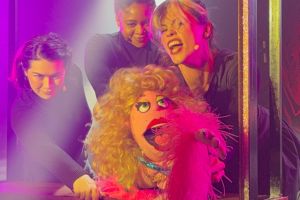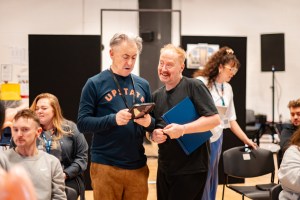
There are glimmers of promise in writer/actor Nancy Farino’s new play Fatherland, a ramshackle story of a road trip. Both play and journey are full of good intentions, light humour and human insight. But neither quite reaches their destination.
Farino also stars as Joy, the ironically named, depressed 20-something, who gets persuaded to join her father Winston Smith (Jason Thorpe) in his newly restored school bus, Buster, and set off for County Mayo to discover their roots. Winston obviously bears the same name as George Orwell’s beleaguered hero in 1984, a fact that seems to mean both something and nothing.
That is the difficulty with the entire play, Farino’s first. It bursts with good ideas and interesting allusions, but despite its swift running time and an inventive production from director Tessa Walker, it is curiously formless and slightly less involving than it should be.
Farino sets a lot of hares running as the bus sets off. Joy is troubled by dark dreams that freeze her in perpetual winter like a figure in myth. Her relationship has broken up. She fears for her future. Winston, meanwhile, is concealing a heavier burden. He’s a self-proclaimed life coach with a relentless philosophy of positivity, but through his flashback conversations with a lawyer called Claire (Shona Babayemi), it gradually becomes clear that one of his mentees has hit problems.

It also emerges that he is barely qualified to help others manage their lives, given his own record as a womaniser and a man who runs from responsibility as soon as it requires him to shoulder any kind of responsibility or make any sort of change.
This is the most interesting thread of the play, and Thorpe is utterly compelling as a man whose surface charm and genuine warmth hide more troubled depths. The moment when he is forced to listen to a recording of his conversation with his former patient – with emotions swimming across his face – is exceptionally powerful, as he registers every second of his own inadequacy in the face of true despair.
But Farino swerves away from fully exploring that story, just as she hints at a backstory for Claire and her father that is never probed, despite an attractively warm performance from Babayemi. It’s hard not to suspect that it is the daughter’s troubled relationship with sleep and with her historic inheritance from an absent father that most excites her, and she is wonderfully exasperated as Joy, forever shrouded in a warm scarf. Yet the constant switches in focus distract from the momentum of the narrative.
Walker’s production, though, is consistently imaginative, with Debbie Duru’s stripped-back designs creating atmosphere with just a couple of chairs, a portable CD player, and Christopher Nairne’s misty lighting. Rebecca Wield’s movement direction controls time and place beautifully.
It’s an evening full of talent and hope, but ultimately, it’s Thorpe’s performance that just about holds it together.















